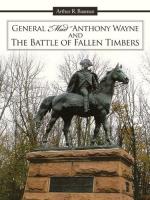|
This section contains 378 words (approx. 2 pages at 300 words per page) |
Encyclopedia of World Biography on Anthony Wayne
The American soldier Anthony Wayne (1745-1796) became a hero during the American Revolution and in his later campaigns against the Indians.
Anthony Wayne was born in Easttown, Pa., on Jan. 1, 1745. He attended local schools and the Philadelphia academy. In 1763 he began a career in surveying, principally in Nova Scotia. In 1766 he and his wife settled down at Waynesborough, Pa., the family property, where Wayne helped his father in the profitable business of farming and of operating a tannery.
When the Revolution began in 1775, Wayne organized a regiment of infantry and was appointed colonel. His military career was varied and honorable. First assigned to the Army unit covering the retreat of American forces from Canada, he fought in the Battle of Three Rivers, where he was wounded. Next he joined George Washington and the main body of the Army at Morristown, N.J., in February 1777, receiving promotion to brigadier general. He distinguished himself in several battles, but his greatest exploit was the capture of Stony Point, a British stronghold on the Hudson River, in July 1779. In command of a picked corps of 1,300 men, Wayne attacked at midnight. In a brilliant tactical maneuver, he took the garrison by surprise, killing or wounding 123 and capturing 575 men. A grateful Congress voted him a gold medal. The whole country acclaimed him, and Washington praised his "judgment and bravery."
For the remainder of the war, Wayne served with the Marquis de Lafayette in Virginia until the British surrendered at Yorktown. When peace came in 1783, he retired as brevet major general. In 1792 President Washington recalled him to serve as commander in chief of the Army. His assignment was to destroy the Indian power north of the Ohio River. For a year Wayne gathered and trained an army; in the spring of 1793 they set out for the west. At Fallen Timbers (near present-day Toledo) he defeated the Indians in August 1794. He negotiated the Treaty of Greenville with the chiefs (1795), by which the several tribes acknowledged American supremacy in the region. This ended a generation of warfare on the frontier.
While on a tour of inspection of frontier posts, Wayne died on Dec. 15, 1796, at Presque Isle (Erie) in Pennsylvania. Often impetuous and occasionally rash, he was called "mad," but none disputed his courage and competence.
|
This section contains 378 words (approx. 2 pages at 300 words per page) |


